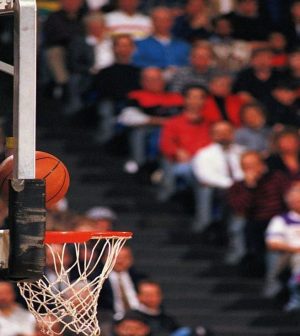- 10 Strategies to Overcome Insomnia
- Could Artificial Sweeteners Be Aging the Brain Faster?
- Techniques for Soothing Your Nervous System
- Does the Water in Your House Smell Funny? Here’s Why
- Can a Daily Dose of Apple Cider Vinegar Actually Aid Weight Loss?
- 6 Health Beverages That Can Actually Spike Your Blood Sugar
- Treatment Options for Social Anxiety Disorder
- Understanding the Connection Between Anxiety and Depression
- How Daily Prunes Can Influence Cholesterol and Inflammation
- When to Take B12 for Better Absorption and Energy
A Pre-Game Routine Can Boost an Athlete’s Performance: Study

NBA great Michael Jordan had a special ritual he would follow before every free throw: He would assume a shoulder-width stance, spin the basketball in his hands, bounce the ball three times, and then spin the ball once more while focusing on the rim before finally taking his shot.
Now, new research suggests similar routines could improve your sports performance, whether you’re an amateur or elite athlete.
In fact, many top professional athletes have a pre-performance routine (PPR), which can include specific movements or thoughts.
“Routines such as that of Jordan can strengthen concentration and help to dive into optimal mental state for performance,” said senior study author Peter Gröpel, a sports psychologist from the University of Vienna in Austria.
Gröpel and his colleagues analyzed data from 800 athletes in 15 sports and found that performance significantly improved after athletes learned and used a PPR, and that those with a PPR outperformed those without one.
These results were seen in both lab assessments and actual sports competitions, in situations with and without pressure, and were independent of athletes’ age, gender, skill level, type of routine and how long it took to learn the routine.
The study was published recently in the International Review of Sport and Exercise Psychology.
“What we have seen is that using a PPR improves performance regardless of how simple or complex the routine is,” Gröpel said in a university news release.
“It is of advantage in any sport task which allows a few seconds of preparation time, such as service in tennis or putt in golf,” he said. “We have observed positive effects across a variety of sport tasks, age classes, skill levels and for both genders.”
The findings may encourage athletes, coaches and sports psychologists to learn and use PPRs in practices, according to the study authors.
More information
The U.S. National Library of Medicine explains how nutrition affects athletic performance.
SOURCE: University of Vienna, news release, Nov. 11, 2021
Source: HealthDay
Copyright © 2026 HealthDay. All rights reserved.










